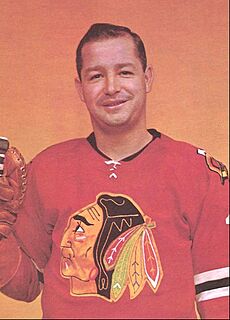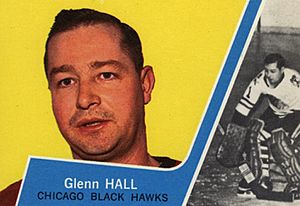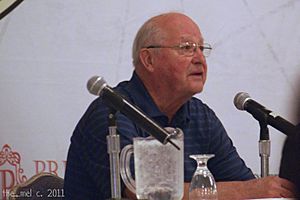Glenn Hall facts for kids
Quick facts for kids Glenn Hall |
|||
|---|---|---|---|
| Hockey Hall of Fame, 1975 | |||

Hall with the Chicago Black Hawks in the 1960s
|
|||
| Born | October 3, 1931 Humboldt, Saskatchewan, Canada |
||
| Died | January 7, 2026 (aged 94) Stony Plain, Alberta, Canada |
||
| Height | 5 ft 11 in (180 cm) | ||
| Weight | 190 lb (86 kg; 13 st 8 lb) | ||
| Position | Goaltender | ||
| Caught | Left | ||
| Played for | |||
| Playing career | 1951–1971 | ||
Glenn Henry Hall (October 3, 1931 – January 7, 2026) was a legendary Canadian professional ice hockey goaltender. He was known as "Mr. Goalie" because he rarely missed a game. Hall set an amazing record for goalies by playing 502 games in a row! He played for the Detroit Red Wings, Chicago Blackhawks, and St. Louis Blues during his career.
Glenn Hall won the Vezina Trophy three times, which was given to the goalie on the team that allowed the fewest goals. He was also chosen as the best goaltender in the league (First Team All-Star) a record seven times. In 1956, he won the Calder Memorial Trophy as the best rookie player. Hall was also the first goalie to use the "butterfly style" effectively, a technique many goalies use today. In 2017, he was recognized as one of the 100 Greatest NHL Players ever.
Contents
Glenn Hall: Hockey's "Mr. Goalie"
Early Days with the Detroit Red Wings
Glenn Hall began his professional hockey journey after playing junior hockey. He signed with the Detroit Red Wings in 1949. For a few years, he played in Detroit's minor league teams. In the 1952 playoffs, he was a backup goalie for the finals. Even though he didn't play, his name was still added to the Stanley Cup! This happened before he even played his first official NHL game.
Hall became the main goalie for the Red Wings in the 1955–56 season. He took over from another famous goalie, Terry Sawchuk. In his first full season, Hall played every single game. He achieved twelve shutouts (games where he didn't let any goals in). He also won the Calder Memorial Trophy as the best rookie. He was also named a Second Team All-Star goalie. After his second full season, where he again played every game and was named a First Team All-Star, he was traded. He moved to the Chicago Blackhawks along with Ted Lindsay.
Becoming a Star with the Chicago Blackhawks
After joining the Chicago Black Hawks, Hall continued his amazing play. He kept his streak of playing in every game going. In 1961, Hall helped the Black Hawks win their first Stanley Cup Championship since 1938. They beat Detroit 4-2 in the series.
On November 7, 1962, Hall's incredible streak of consecutive games ended. He had back problems during a game against the Boston Bruins. Another goalie, Denis DeJordy, took his place. Hall had played 502 complete games in a row, spanning eight seasons! This is an NHL record for goalies that is very unlikely to be broken. What's even more amazing is that he never wore a goalie mask or helmet during this streak. He only started wearing one later in his career. Today, masks are required for all goalies. It's said that Hall would throw up before each game, then drink orange juice. During his time in Chicago, he was chosen as a First Team All-Star goalie five times and a Second Team All-Star goalie three times.
Later Success with the St. Louis Blues
In 1967, Hall won the Vezina Trophy. Despite this, at 36 years old, he was available in the 1967 NHL Expansion Draft. The new St. Louis Blues team picked him. The Blues were one of six new teams that year. They brought in experienced players like Red Berenson and Phil Goyette. Hall's excellent goaltending led them to the Stanley Cup Finals.
Many hockey fans expected the experienced Montreal Canadiens to easily beat the new Blues team. But Hall's amazing play helped the Blues perform surprisingly well. Even though the Blues lost the series 4-0, all four games were very close, decided by just one goal. Hall's outstanding performance was recognized with the Conn Smythe Trophy. This award is given to the Most Valuable Player in the playoffs. It's rare for a player from the losing team to win it! Hall said, "Even though we lost to the Canadiens in a sweep, I don't feel it tainted my winning the Smythe one bit. The odds were heavily stacked against us right from the start."
In 1968, another famous goalie, Jacques Plante, joined the Blues. He shared goaltending duties with Hall. Together, they had a great 1968–69 season. They won the Vezina Trophy and set a Blues' record with 13 shutouts. Hall was also named a First Team All-Star goalie for the seventh time, a record for goalies.
Retirement and Lasting Legacy
Hall first retired after the 1968–69 season. However, he returned to play 18 more games in the 1969–70 season. He was in goal when Bobby Orr of the Boston Bruins scored the winning goal in Game 4 of the 1970 Finals. This goal clinched the Stanley Cup for the Bruins.
Hall's career officially ended after the 1970–71 season when he retired at age 39. In 1975, he was inducted into the Hockey Hall of Fame. He later won his third Stanley Cup in 1989 as the goaltending coach for the Calgary Flames. Glenn Hall was the grandfather of hockey player Grant Stevenson. Hall passed away on January 7, 2026, at the age of 94.
Hall's Impact on Hockey
Glenn Hall changed how goalies play the game. He made the "butterfly style" of goaltending popular, and it is now used by many goalies around the world. He finished his career with 407 wins (13th all-time) and 84 shutouts (fourth all-time). His career Goals Against Average (GAA) was 2.49, which means he allowed about 2.49 goals per game on average. He was also chosen for eleven All-Star Games. Many people consider Hall to be one of the best goalies ever.
Hall still holds the record for the most First Team All-Star selections (7). He achieved this while playing against other great goalies like Terry Sawchuk and Jacques Plante. In 1998, The Hockey News ranked him number 16 on their list of the 100 Greatest Hockey Players. In 2005, his hometown of Humboldt, Saskatchewan, honored him with a monument in Glenn Hall Park. In 2017, the NHL named him one of the 100 Greatest NHL Players in history during its centennial celebrations. His amazing winning percentage and his unbreakable record of 502 consecutive starts are key reasons he is considered one of the greatest.
Awards and Achievements
- Calder Memorial Trophy Winner in 1956.
- Played in 1955, 1956, 1957, 1958, 1960, 1961, 1962, 1963, 1964, 1965, 1967, 1968, and 1969 NHL All-Star Games.
- Selected to the NHL first All-Star team in 1957, 1958, 1960, 1963, 1964, 1966, and 1969.
- Selected to the NHL second All-Star team in 1956, 1961, 1962, and 1967.
- Vezina Trophy Winner in 1963, 1967, and 1969.
- Conn Smythe Trophy Winner in 1968.
- Stanley Cup Championship in 1952, 1961, and 1989 (as goaltender coach).
- Holds NHL record for most consecutive games started by a goaltender with 502 games.
- Inducted into the Hockey Hall of Fame in 1975.
- In 1998, he was ranked number 16 on The Hockey News' list of the 100 Greatest Hockey Players.
- In January 2017, Hall was part of the first group of players to be named one of the '100 Greatest NHL Players' in history.
- Chicago Blackhawks Hall of Fame and number retired.
- St. Louis Blues Hall of Fame.
Career statistics
Regular season and playoffs
| Regular season | Playoffs | ||||||||||||||||||||
|---|---|---|---|---|---|---|---|---|---|---|---|---|---|---|---|---|---|---|---|---|---|
| Season | Team | League | GP | W | L | T | MIN | GA | SO | GAA | SV% | GP | W | L | MIN | GA | SO | GAA | SV% | ||
| 1947–48 | Humboldt Indians | N-SJHL | 5 | 5 | 0 | 0 | 300 | 17 | 0 | 3.40 | — | 2 | 0 | 2 | 120 | 15 | 0 | 7.50 | — | ||
| 1948–49 | Humboldt Indians | N-SJHL | 24 | 13 | 9 | 2 | 1420 | 86 | 1 | 3.63 | — | 7 | 3 | 4 | 420 | 36 | 0 | 5.14 | — | ||
| 1949–50 | Windsor Spitfires | OHA-Jr. | 43 | 31 | 11 | 1 | 2580 | 152 | 0 | 3.53 | — | 11 | 6 | 5 | 660 | 37 | 0 | 3.36 | — | ||
| 1950–51 | Windsor Spitfires | OHA-Jr. | 54 | 32 | 18 | 4 | 3240 | 167 | 6 | 3.09 | — | 8 | — | — | 480 | 30 | 0 | 3.75 | — | ||
| 1951–52 | Indianapolis Capitals | AHL | 68 | 22 | 40 | 6 | 4190 | 272 | 0 | 3.89 | — | — | — | — | — | — | — | — | — | ||
| 1952–53 | Edmonton Flyers | WHL | 63 | 27 | 27 | 9 | 3780 | 207 | 2 | 3.29 | — | 15 | 10 | 5 | 905 | 53 | 0 | 3.51 | — | ||
| 1952–53 | Detroit Red Wings | NHL | 6 | 4 | 1 | 1 | 360 | 10 | 1 | 1.67 | .931 | — | — | — | — | — | — | — | — | ||
| 1953–54 | Edmonton Flyers | WHL | 70 | 29 | 30 | 11 | 4200 | 259 | 0 | 3.70 | — | 13 | 7 | 6 | 783 | 44 | 2 | 3.37 | — | ||
| 1954–55 | Edmonton Flyers | WHL | 66 | 38 | 18 | 10 | 3960 | 187 | 5 | 2.83 | — | 16 | 11 | 5 | 1000 | 43 | 1 | 2.58 | — | ||
| 1954–55 | Detroit Red Wings | NHL | 2 | 2 | 0 | 0 | 120 | 2 | 0 | 1.00 | .967 | — | — | — | — | — | — | — | — | ||
| 1955–56 | Detroit Red Wings | NHL | 70 | 30 | 24 | 16 | 4200 | 147 | 12 | 2.10 | .921 | 10 | 5 | 5 | 604 | 28 | 0 | 2.78 | .908 | ||
| 1956–57 | Detroit Red Wings | NHL | 70 | 38 | 20 | 12 | 4200 | 156 | 4 | 2.23 | .926 | 5 | 1 | 4 | 300 | 15 | 0 | 3.00 | .884 | ||
| 1957–58 | Chicago Black Hawks | NHL | 70 | 24 | 39 | 7 | 4200 | 200 | 7 | 2.86 | .908 | — | — | — | — | — | — | — | — | ||
| 1958–59 | Chicago Black Hawks | NHL | 70 | 28 | 29 | 13 | 4200 | 208 | 1 | 2.97 | .897 | 6 | 2 | 4 | 360 | 21 | 0 | 3.50 | .909 | ||
| 1959–60 | Chicago Black Hawks | NHL | 70 | 28 | 29 | 13 | 4200 | 180 | 6 | 2.57 | .917 | 4 | 0 | 4 | 249 | 14 | 0 | 3.37 | .892 | ||
| 1960–61 | Chicago Black Hawks | NHL | 70 | 29 | 24 | 17 | 4200 | 176 | 6 | 2.51 | .920 | 12 | 8 | 4 | 772 | 26 | 2 | 2.02 | .936 | ||
| 1961–62 | Chicago Black Hawks | NHL | 70 | 31 | 26 | 13 | 4200 | 185 | 9 | 2.64 | .913 | 12 | 6 | 6 | 720 | 31 | 2 | 2.58 | .924 | ||
| 1962–63 | Chicago Black Hawks | NHL | 66 | 30 | 20 | 15 | 3910 | 166 | 5 | 2.55 | .916 | 6 | 2 | 4 | 360 | 25 | 0 | 4.17 | .896 | ||
| 1963–64 | Chicago Black Hawks | NHL | 65 | 34 | 19 | 11 | 3860 | 148 | 7 | 2.30 | .930 | 7 | 3 | 4 | 408 | 22 | 0 | 3.24 | .889 | ||
| 1964–65 | Chicago Black Hawks | NHL | 41 | 18 | 17 | 5 | 2440 | 99 | 4 | 2.43 | .920 | 13 | 7 | 6 | 760 | 28 | 1 | 2.21 | .925 | ||
| 1965–66 | Chicago Black Hawks | NHL | 64 | 31 | 24 | 7 | 3747 | 164 | 4 | 2.63 | .914 | 6 | 2 | 4 | 347 | 22 | 0 | 3.80 | .874 | ||
| 1966–67 | Chicago Black Hawks | NHL | 32 | 19 | 5 | 5 | 1664 | 66 | 2 | 2.38 | .920 | 3 | 1 | 2 | 176 | 8 | 0 | 2.73 | .923 | ||
| 1967–68 | St. Louis Blues | NHL | 49 | 19 | 21 | 9 | 2858 | 118 | 5 | 2.48 | .912 | 18 | 8 | 10 | 1111 | 45 | 1 | 2.43 | .916 | ||
| 1968–69 | St. Louis Blues | NHL | 41 | 19 | 12 | 8 | 2354 | 85 | 8 | 2.17 | .928 | 3 | 0 | 2 | 131 | 5 | 0 | 2.29 | .931 | ||
| 1969–70 | St. Louis Blues | NHL | 18 | 7 | 8 | 3 | 1010 | 49 | 1 | 2.91 | .904 | 7 | 4 | 3 | 421 | 21 | 0 | 2.99 | .907 | ||
| 1970–71 | St. Louis Blues | NHL | 31 | 13 | 11 | 8 | 1761 | 71 | 2 | 2.42 | .917 | 3 | 0 | 3 | 180 | 9 | 0 | 3.00 | .864 | ||
| NHL totals | 906 | 407 | 326 | 162 | 53,544 | 2,230 | 84 | 2.49 | .917 | 115 | 49 | 65 | 6,899 | 320 | 6 | 2.78 | .911 | ||||
See also
 In Spanish: Glenn Hall para niños
In Spanish: Glenn Hall para niños
- Butterfly style
- List of NHL goaltenders with 300 wins
 | Aurelia Browder |
 | Nannie Helen Burroughs |
 | Michelle Alexander |



